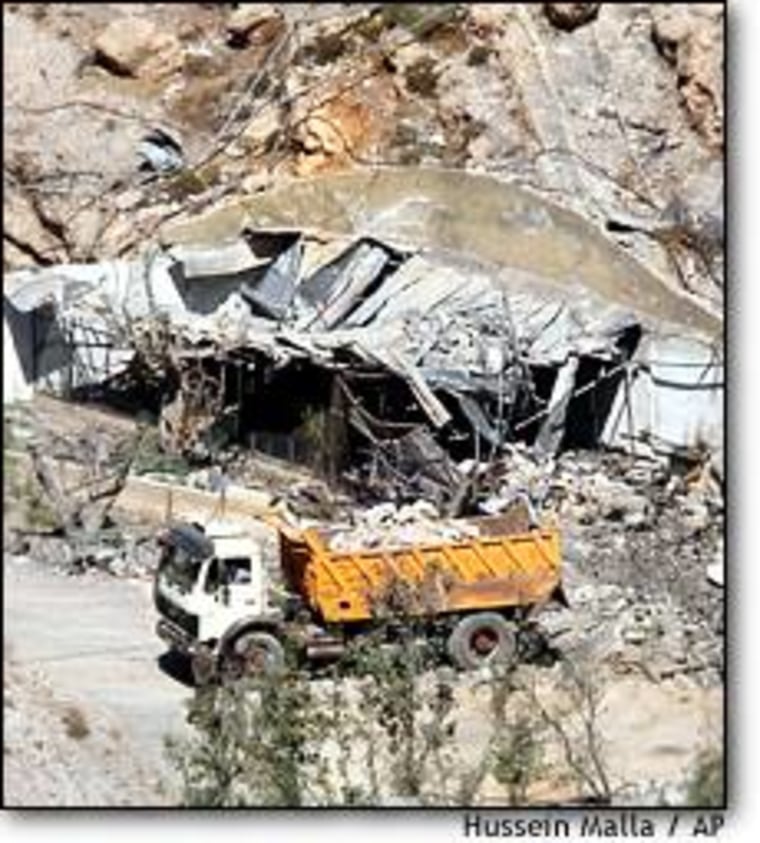Israel’s attack on an alleged guerrilla training camp in Syria is nothing new: The Jewish state long has been the world’s foremost practitioner of both retaliatory and pre-emptive military action. What makes the attack more significant is the implicit seal of U.S. approval such attacks enjoy since the United States adopted a pre-emptive foreign policy doctrine.

THE U.S. DECISION not to condemn the Israeli raid into Syria cannot have surprised many. With U.S. foreign policy now firmly committed to pre-emptive war and U.S. troops still busy with just such a conflict in Iraq, Washington could hardly “tisk, tisk” over an Israeli decision to hit out at a charter member of the State Department’s list of “state sponsors of terrorism.” President Bush’s staunch support for Israel’s current security policies left little question about where he would stand.
But what if Israel had launched a series of air raids that destroyed Iran’s nuclear infrastructure, as it did in 1981 against Iraq? In a scenario regarded as even more explosive, what if India’s air force cited “pre-emptive reasoning” to try to wipe out Pakistan’s nuclear arsenal in a lightning attack?
Both scenarios — an Israeli raid on Iran and an Indian strike at Pakistan — are considered to be within the realm of possibility. So much so, a military official says, that U.S. war colleges are “gaming them” in an effort to be prepared for the possible consequences.
“These scenarios have been run again and again, and there is no consensus on how either would be contained,” says the official, who requested anonymity. “They truly are doomsday scenarios.”
MORE OR LESS?
Ever since the Bush administration unveiled its vision for U.S. national security policy in the post-9/11 world, the question policy-makers have debated is this: Does the new, more aggressive U.S. stance make such catastrophic moves more likely by undermining international law or less likely by bringing accountability to potential terrorists?
Many analysts and former policy-makers, particularly those now in opposition and older conservatives who helped shepherd the balance of power during the Cold War, fear the broad latitude that “pre-emptive” action provides for the use of military force will be seized upon by other nations as a justification for war.
The Bush administration argues, forcefully, that the kinds of retaliatory actions typical of U.S. military activity during the 1980s and 1990s — the shelling of Iranian oil rigs or Tomahawk missile strikes at Afghan “terrorist bases,” for instance — led the world to question America’s will.
The Bush doctrine, officially called the National Security Strategy of the United States, was made public last year just after the first anniversary of the Sept. 11 attacks. It is a book-length exposition, but its main change from traditional U.S. doctrine is its willingness to be the first to use force.
“Traditional concepts of deterrence will not work against a terrorist enemy whose avowed tactics are wanton destruction and the targeting of innocents; whose so-called soldiers seek martyrdom in death and whose most potent protection is statelessness,” it says.
RETALIATORY PRE-EMPTION
In the strictest sense, the Israeli strike into Syria over the weekend was more retaliatory than pre-emptive: payback for the bomb in Haifa on Saturday that killed 19 people.
The terrorist bombing was quickly claimed by Islamic Jihad, one of three radical groups currently mounting suicide attacks against Israel (the other two are Hamas and the Al Aqsa Martyrs brigade of Yasser Arafat’s Fatah movement).
In fact, strictly speaking, Israel struck not just at Syria but at Iran, as well.
“Islamic Jihad is basically a synonym for Iranian intelligence,” says an Israeli diplomat. “Syria is the conduit and the host, but Iran is the paymaster.”
Islamic Jihad, in fact, admitted as much in 1993, when its then-leader, Fathi Shiqaqi, told Newsday that: “Iran gives us money and supports us, then we supply the money and arms to the occupied territories and support the families of our people. Just about all of it goes there because that’s where most of our organization is.” Shiqaqi was killed by Israeli agents in Malta in 1995, and his successor, Abdullah Shallah, lives in Damascus, traveling frequently to Tehran.
LIMITED OPTIONS
There is not much to learn in the response of either Syria or Iran to the Israeli strike. Both of them long ago gave up any idea of waging conventional war against the Jewish state. Where Syria, for instance, once was looked upon as a serious military power thanks to the patronage of the Soviet Union, today it fields an army and air force of 1970s relics vastly outclassed by Israel’s forces, even when the large Israeli nuclear arsenal is discounted.
Islamic Jihad and other such groups are useful to these powers for precisely that reason.
’”There [are] only two ways to attack Israel today,” says a U.S. defense official, requesting anonymity. “You either funnel money to suicide bombers, or you launch an all-out nuclear strike that leaves nothing to chance. Anything else is national suicide.”
